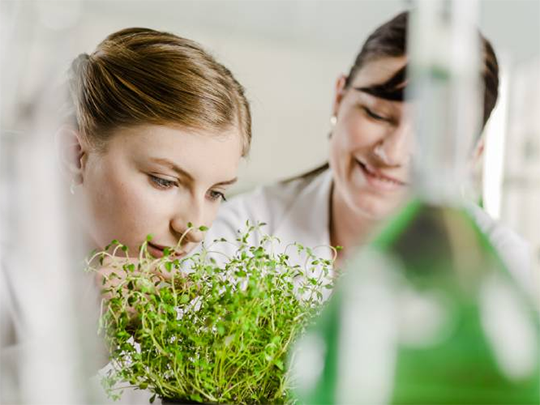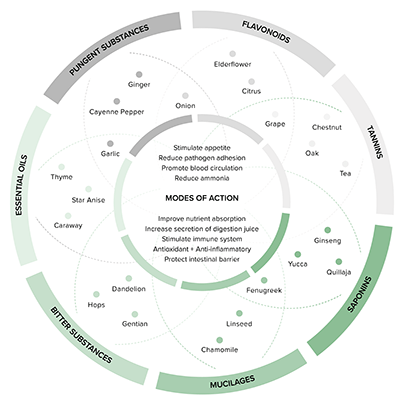Phytogenics, botanicals, essential oils – all the same, or all different?
When searching for literature on phytogenic feed additives in media or technical journals you will often stumble over some words, which are used synonymously to “phytogenic”, such as “phytochemical,” “phytobiotic,” “essential oil” or “secondary plant compound.”
This summery...
shall clarify the terminology to counteract some potential misunderstandings when going through texts in our business sector or through technical articles.
Phyto – what?

It’s already been 30 years ago, since the phrase „phytogenic feed additives“ has been introduced for the first time by Delacon. Today, this word represents an established and technical term, which also found its way into scientific literature. Nevertheless, we have to be aware, that the word is a self-created term, so that it is hardly manageable to give a clear, scientific definition.
Analyzing the word’s etymology reveals that “phytogenic” consists of the Greek words “Phyton,” which stands for the plant, and “genes” meaning “creating, yielding.” Thus, the most valuable explanation is that phytogenics consist of plant-derived, bioactive substances.
Due to this broad definition, they consist of a wide range of different classes and is reason for the broad spectrum of modes of actions: Essential oils, saponins, flavonoids, mucilages, tannins, pungent substances, bitter substances, each with their own specific modes of action like stimulating production of digestive juices and intestinal nutrient transporters, anti-oxidant and anti-inflammatory effects, quorum sensing inhibition, and gut wall protection.
“Phytogenic feed additives or phytogenics are standardized mixtures of herbs, spices, other plants and their extracts with proven efficacy. “
Why do we find phytogenics in nature
Most of these classes are summarized by the scientific term “secondary plant products”, which refer to substances produced by a plant in relatively small amounts being related to survival strategies: they are used to defense against herbivorous, to prevent some parasites, or to attract pollinators via producing a certain smell or causing a typical colour of the plant. So, although they are not directly needed for the survival of the organism, secondary plant products can have a crucial impact on the lifespan of a particular plant. When taken up by humans or livestock, these secondary plant products may influence the physiology and can show pharmacologic effects as stated above.
Pioneering language
Terms like phytobiotics or phytochemicals are the product of marketing language and refer to the same substances, like phytogenics do and thus, these words follow the pioneer.

Phytogenics are more than essential oils
Since essential oils are a major component of phytogenics, they are often used in the same context. Nevertheless, as mentioned above, essential oils do represent a sub-category of phytogenic feed additives and should not be used conterminously to phytogenics. Essential oils are not characterized by a certain chemical structure, but are a volatile and natural blend of various compounds. This complex may consist of 20 – 60 different components in different concentrations, with two or three major components being present at relatively high amounts in a certain oil.
At the end it is worth to mention, that naturally does not mean the same as phytogenic: all phytogenics are natural, but not every natural component is phytogenic. Here it is good to realize that even antibiotics are natural in their original sense, since they are produced by molds and bacteria. While keeping in mind that modern antibiotic drugs are often produced synthetically.

Marlene Forrai
Storyteller, foodie, life-long learner – may be the three words that describe me best. Unfortunately, you cannot make a living by only eating food, even though it’s healthy. Therefore, I have developed my skills in Marketing, Online Communications and Content Management to enlighten people around the globe about the power of nature and its contribution to animal as well as human health. Since February 2022, Marlene started a new career path outside of Delacon.










